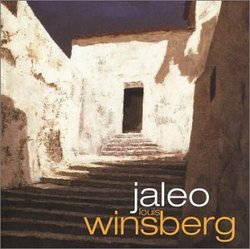| All Artists: Louis Winsberg Title: Jaleo Members Wishing: 0 Total Copies: 0 Label: Sunny Side Original Release Date: 1/1/2003 Re-Release Date: 6/3/2003 Genres: International Music, Pop, Latin Music Styles: South & Central America, Brazil, Europe, Eastern Europe, Latin Music, Flamenco Number of Discs: 1 SwapaCD Credits: 1 UPCs: 016728301329, 0044001641527 |
Search - Louis Winsberg :: Jaleo
 | Louis Winsberg Jaleo Genres: International Music, Pop, Latin Music
|
Larger Image |
CD Details |
CD Reviews"Jazz-Flamenco & Etc. Fusion" fit for the Grammy's L. K. Coleman | New Orleans, LA USA | 07/10/2003 (5 out of 5 stars) "If Louis Winsberg and this CD are not nominated for Grammy awards, there's no justice. Winsberg is a class-act, a superb musician who has produced an equally superb album. This is "flamenco-jazz fusion," not traditional nor "pure" flamenco (whatever that is) - yet, even so, there are parts that are everything that flamenco is supposed to be. More importantly, you will tap your feet, you will rise to dance, and you will find yourself smiling. Louis Winsberg, joined by other first-class talents, will show you what "modern" and "international" music can and should be. This is not the Frenchman of cinematic fame, pensively staring into the camera for interminable scenes filled with indescribable angst. He is all smiles and joy, even when his music is serious and profound. It needs to be said that one of the most outstanding features of this album is that it is an effort of "flamenco-jazz fusion" that began, not with flamenco artists, but with a jazz artist. The reason that is outstanding is because flamenco has such a challenging technique, subtly complicated rhythmic structures, etc., etc., that it has been extremely difficult to go from a non-flamenco form to flamenco and make it end up somewhere that has any value at all - the reason why nearly all successful "fusions" began with flamenco artists who later drifted into other forms. It takes years - yes, that's "years" - of constant exposure to the flamenco milieu, the constant playing, singing, dancing with other flamencos as well as laughing, crying, eating and drinking with them in order to absorb that magic combination of rhythmic and melodic sense, plus the technique necessary to express it, to have the ineffable "something" that produces the sound that the word "flamenco" evokes.So how has Louis Winsberg done it? First, he is the son of an artist (an accomplished painter) reared in the environs of Marseille. The south of France is a cross-roads between many cultures, including that of Spain. This much talented and accomplished artist grew up within this milieu, which has been filled with ex-patriot Spaniards for a very long time (remember the beautiful "Mercedes" and the evil "Fernand Mondego" of Alexandre Dumas' "The Count of Montecristo"?). Spain itself is but a few hundred miles distant. Just as important, Louis peppered his ensemble with several "real" flamenco artists in order to add the necessary backbone. Add to this an incredible talent, a deep well of musical experience, and sundry other complementary influences and the combination is unstoppable. (It's also worth pointing out that in the early '80's Louis used to jam with a group of local Marseille friends who at the time went by the name of "Los Reyes." They later changed their name to "The Gypsy Kings.")The general concept of this album is to explore the origins of and influences upon Spain's Gypsies. Consequently, Winsberg uses musical elements from their homeland, northern India, and the places of their several centuries of wandering: the Near East, the Balkans and, of course, Spain itself. The instruments used and the artists he has gathered for this album both satisfy and complement the concept: The flamenco guitarist is Jean-Baptiste Marino, born and reared in Paris by a French mother and Italian father. He trained in classical guitar for eight years at the Paris conservatory, then fell in love with flamenco and went to live in Spain. The tabla-player and Sanskrit vocalist, Nanda Kumar, took a different route: Born in Singapore of Indian parents, Kumar is an excellent percussionist who became so taken with flamenco's forms that he now makes his residence in Madrid - a venue he considers completely appropriate given the Gypsies' origins. Isabel Pelaez, the dancer and singer, is from Sevilla and sounds it (and looks it, too, if you are fortunate enough to catch one of their shows), and the principal flamenco singer, Jose Montealegre, is likewise a Spaniard although he now makes France his principal home. Frenchman Norbert Lucarain is equally adept on the drums as on the vibes, the latter of which he plays so well that he can do a completely unexpected but incredible "Lionel Hampton plays flamenco on tour of the Balkans" that would have made the late, great artist shout "Yeah! Olé, man! And put that damn gun down!"All together, these artists move this album from driving flamenco to smooth jazz, peppered with Indian, Balkan and other influences. And when Winsberg cleverly adds some rock riffs on electric guitar there are parts of this CD that are very reminiscent of the legendary albums of the "rock-jazz fusion" group "Caldera" (where Jorge Strunz began before he joined forces with Ardeshir Farah), influences of Pat Matheny, and hints of the old Friedemann ("Indian Summer", "Aquamarine").This is a grand and "must have" album. Buy it, love it, and smile that humans can do such things despite all their many flaws."
|

 Track Listings (11) - Disc #1
Track Listings (11) - Disc #1